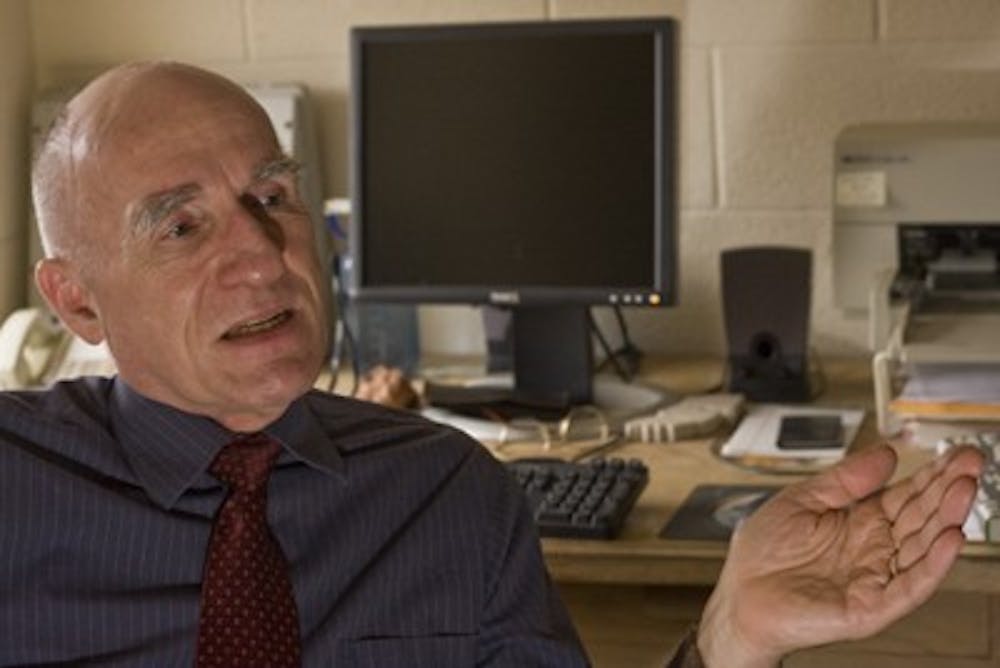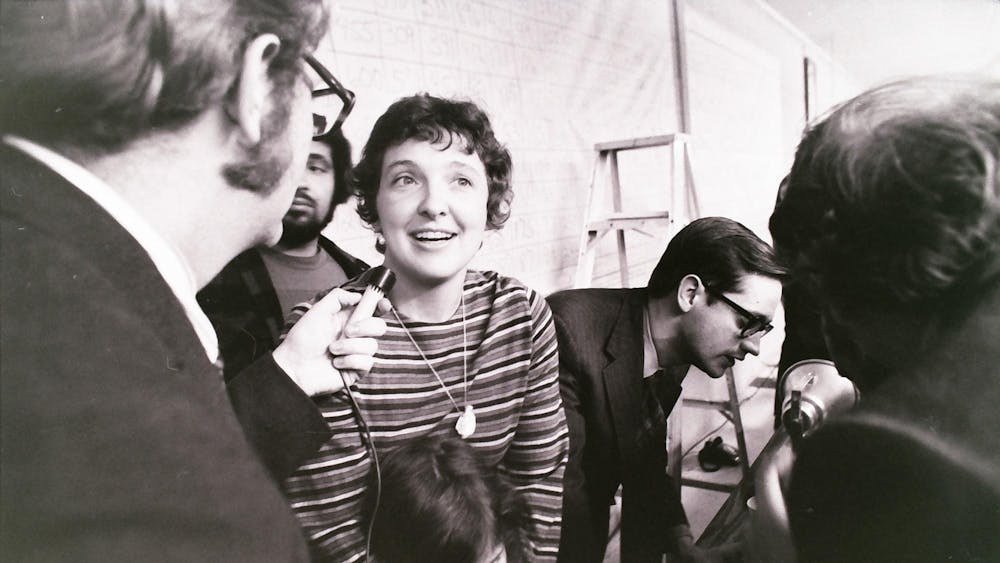Professor Scott Russell Sanders arrived a few minutes early Monday night, organizing some papers to hand out to the students in his graduate-level creative non-fiction writing class.\nA few minutes later, his students trickled into the room, smiling, waiting for his opening remarks. \n“OK everyone, I am now passing out a map to my house,” Sanders said, pointing out directions and street names. “My wife Ruth and I are expecting you for tea and cookies.”\nThe classroom was organized like Donald Trump’s infamous boardroom. Sanders sat with his students at a long table and talked back and forth.\nBut conversation in Sanders’ boardroom had no parallels to “The Apprentice.” Instead, it emulated one of FDR’s fireside chats: laid back and relaxed, but with in-depth discussions about great thinkers such as Virginia Woolf. \nStudents passing by paused to peek through the doorway, stopping when they heard the unexpected laughter on the first floor of Ballantine Hall.\n“How many of you keep a journal or a notebook of some sort?” Sanders asked, looking around the table and counting hands. \nWithin a few seconds, every hand waved high in the air.\n“That’s great,” he said. “Even if your work doesn’t get published, you are still writers.”
Write on\nEven though Sanders calls teaching his “deepest pleasure,” he said it’s time to begin a new chapter: retirement. In 2009, Sanders will end his career as an English professor, but his students will always remember his warm and charming personality.\n“Scott is very approachable and personable,” said Chad Anderson, a graduate student in one of Sanders’ classes. “I never feel like I really have to impress him in everything that I say and everything that I do.” \nWhile Sanders plans to spend his retirement with family and friends, he has no plans to lay his pen to rest.\n“The morning I have to walk up and turn in the last set of grades, I’m just going to continue what I do every day – writing and expressing my thoughts,” Sanders said.
A love story\nEven though he is a teacher and writer by trade, as a boy, Sanders was interested in science.\nOne of his first encounters with IU was a science camp for high school students, where he met his fellow scientist and future wife, Ruth.\n“We have been in love ever since,” Sanders said. \nAfter graduating from Brown University and the University of Cambridge, Sanders came back to the Midwest to reunite with Ruth, and, of course, to teach.\n“Ruth is the reason why I am here,” Sanders said, shifting positions in his chair. “Without her, I may not be teaching here at IU.”\nRuth has affected not only his teaching career, but also his writing. Whenever Sanders has trouble conveying his thoughts, she advises him.\n“She is the first one to solve my puzzling moments,” Sanders said. “If you can’t write clearly about your thoughts, your thoughts aren’t clear.”
Writing naturally\n“It was my junior year at Brown when I switched to English literature and fell in love with the language and its most famous authors,” Sanders said, citing William Faulkner, Wallace Stegner and Henry David Thoreau as his literary inspirations. \nSince his college days, Sanders has published 19 books, including eight works of fiction. Essays on fiction and children’s books crowd his office bookshelves.\n“In my writings, I make an effort to combine reflections on private life with reflections on public life,” he said.\nOne way Sanders concocts this combination is by relaying the experience of walking and biking to his father’s job at Ravenna Arsenal, an army base in Ohio that assembled bombs.\n“At the plant there was a confrontation with wild nature and human destructiveness,” Sanders said.\nThis conflict, between creation and demolition, inspired his collection of essays titled “Paradise of Bombs.”\n“Inside the plant, wildlife flourished,” Sanders said. “But at the same time, there was machinery of destruction.” \nSanders still enjoys surrounding himself with nature by walking or biking to campus. He said he can establish a closer connection to the earth and often finds subjects for his writing while traveling at a slower pace.\n“Biking and walking keep me in contact with the weather,” he said. “I love hearing the birds sing, the wind blowing in my face and seeing 360 degrees.”
TURNING THE PAGE\nAfter three hours of flirting with essays and analyzing short stories, the class was ready to come to a close. But the discussion continued as students exited the class room. \n“I am cherishing every moment I have with Professor Sanders,” said IU graduate student Jenny Burdge. “His classroom is truly my home away from home.” \nSanders’ work also goes beyond the confines of the classroom.\n“I think what makes Professor Sanders stand out is when you say something, he actually acknowledges your words and makes you feel as though you should keep talking and doing what you are doing,” said Kate Russell, a graduate student studying fiction. “He is always pointing us in the right direction.”\nAlthough Sanders will leave the classroom for the last time next year, his work will last a lifetime.\n“Just because I have to retire doesn’t mean I will stop writing. I have some more work to do,” Sanders said. “I get the pleasure of making things out of words, like others do with clay.”






